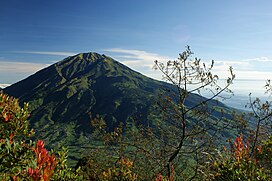| Mount Merbabu | |
|---|---|
 Mt Merbabu viewed from Mount Merapi Mt Merbabu viewed from Mount Merapi | |
| Highest point | |
| Elevation | 3,145 m (10,318 ft) |
| Prominence | 2,432 m (7,979 ft) |
| Listing | Ultra Ribu |
| Coordinates | 07°27′18″S 110°26′24″E / 7.45500°S 110.44000°E / -7.45500; 110.44000 |
| Naming | |
| English translation | Mountain of ash |
| Language of name | Indonesian |
| Geography | |
  | |
| Parent range | Sunda Arc |
| Geology | |
| Rock age | 700.000 Years |
| Mountain type | Dormant stratovolcano |
| Last eruption | 1797 |
| Climbing | |
| Easiest route | Hike starting near Kopeng |
Mount Merbabu (Indonesian: Gunung Merbabu) is a dormant stratovolcano in Central Java province on the Indonesian island of Java. The name Merbabu could be loosely translated as 'Mountain of Ash' from the Javanese combined words; Meru means "mountain" and awu or abu means "ash".
The active volcano Mount Merapi is directly adjacent on its southeast side, while the city of Salatiga is located on its northern foothills. A 1,500m high broad saddle lies between Merbabu and Merapi, the site of the village of Selo, Java, and highly fertile farming land.
There are two peaks; Syarif (3,119 m) and Kenteng Songo (3,145 m). Three U-shaped radial valleys extend from the Kenteng Songo summit in northwesterly, northeasterly, and southeasterly directions.

Two known moderate eruptions occurred in 1560 and 1797. The 1797 event was rated 2: Explosive, on the volcanic explosivity index. An unconfirmed eruption may have occurred in 1570.
Geologically recent eruptions originated from a North Northwest-South Southeast fissure system that cut across the summit and fed the large-volume lava flows from Kopeng and Kajor craters on the northern and southern flanks, respectively.
Merbabu can be climbed from several routes originating from the town of Kopeng on the northeast side, and also from Selo on the southern side. A climb from Kopeng to Kenteng Songo takes between 8 and 10 hours.
An area of 57 square kilometres (22 sq mi) at the mountain has been declared a national park in 2004.
See also
References
- ^ "Mountains of the Indonesian Archipelago" Peaklist.org. Retrieved 2012-06-23.
- ^ "Merbabu: General Information". Global Volcanism Program. Smithsonian Institution. Retrieved 2021-06-24.
- Troll, Valentin R.; Deegan, Frances M.; Jolis, Ester M.; Budd, David A.; Dahren, Börje; Schwarzkopf, Lothar M. (2015-03-01). "Ancient oral tradition describes volcano–earthquake interaction at merapi volcano, indonesia". Geografiska Annaler: Series A, Physical Geography. 97 (1): 137–166. doi:10.1111/geoa.12099. ISSN 0435-3676. S2CID 129186824.
- Wilson, T (2007). "Impacts of the 2006 eruption of Merapi volcano, Indonesia, on agriculture and infrastructure". GNS Science Report. 07: 69p.
- "Merbabu: Eruptive History". Global Volcanism Program. Smithsonian Institution. Retrieved 2021-06-24.
- Simkin, T., and Siebert, L., 1994, Volcanoes of the World: Geoscience Press, Tucson, Arizona, 349 p.
- Lestari Hutan Indonesia Archived 2010-04-20 at the Wayback Machine. Retrieved 26 February 2010.
External links
| National parks of Indonesia | |
|---|---|
| Bali and Nusa Tenggara | |
| Java | |
| Kalimantan | |
| Maluku and Papua | |
| Sulawesi | |
| Sumatra | |